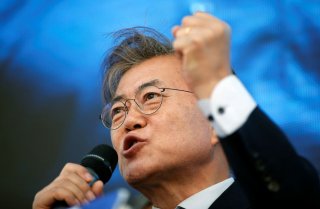South Korea's April Elections Meets the Coronavirus: What Happens?
President Moon has good ratings, but it is still hard to predict.
After South Korea reported its first case of the COVID-19 in mid-January, virus-related issues have since topped the public agenda in every sector including politics and economics. The coronavirus situation has especially put President Moon Jae-in’s government and the ruling Democratic Party of Korea (DPK) on a political rollercoaster with the development of its spread and the progress of government’s containment efforts against it.
The situation initially seemed favorable to the Moon government until early February, when the number of patients started to surge after a “super-spread event” at a regional branch of the Shincheonji Church of Jesus—the Temple of the Tabernacle of the Testimony—located in Daegu, a southern metropolitan city.
For the first few weeks since the event, the ruling bloc had been exposed to attacks from the opposition parties for its “incapability” dealing with the epidemic. But the political winds again changed with the spread of the virus slowing down since mid-March. Around that time, the global society entered upon a new phase of the virus outbreak with the World Health Organization’s declaration of a pandemic.
Moreover, the global community started to note South Korea’s case for the country’s “quick” tests of its people and “efficient” quarantine and containment measures. The Moon government could appeal to people with its “achievements” in the country’s fight against the virus and it led to an increase in the approval rating for the President.
According to recent surveys, more than 50 percent of South Koreans think that President Moon is “doing well” in handling the virus outbreak and the general approval rating of the President is also bound to surpass 50 percent again.
With the April 15 general election to form the country’s 21st National Assembly is just around the corner, the ruling DPK is trying to get the most out of such favorable public opinion to the President. The election result, however, is still hard to predict with other political variables in play.
One the one hand, recent surveys showed many people, around 30 percent, remain politically independent, not supporting any party. On the other hand, the DPK is taking the lead, winning 40 percent of support from the respondents while about 30 percent support the main opposition United Future Party (UFP).
Political watchers say internal feuds within both the liberal and the conservative camps made people reluctant to decide their side until the “last moment,” which is rather unusual compared to previous elections where the percentage of political independents decreased when nearing the election dates.
The competition for the general election got even more complicated after the country’s two major parties created their “satellite parties” in a bid to win more proportional representation seats under the new electoral system designed to give more of these to minor parties.
While the DPK and the UFP are participating in the main vote for 253 constituencies, their satellite parties are only putting forward candidates for the 47 proportional representation seats. But the satellite parties are gaining much less public support than they expected as neither the liberal and conservative camps have united their “enthusiastic” supporters.
Meanwhile, other actual minor parties from both liberal and conservative camps are being “threats” to the ruling party and the main opposition, with their “stronger” slogans appealing to voters in both extremes.
To put it briefly, although the political setting over the virus has eventually become favorable to President Moon Jae-in nearing election day, it does not guarantee the victory of the ruling party. Rather, the result is uncertain due to other variables, such as the country’s new electoral system and the internal feuds within the liberal and conservative camps adding to the complexity of the political dynamics of South Korea.
Jung Da-min is a Staff Reporter at The Korea Times.
Image: Reuters

